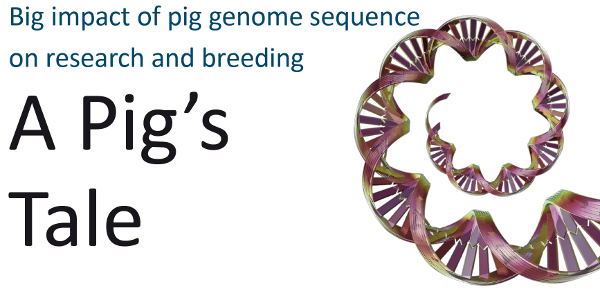Cutting to the heart of swine genomics

An announcement on the completion of a pan-European project called SABRE (Cutting-Edge Genomics for Sustainable Animal Breeding) shows the huge value that EC-funded research projects can bring to the UK. The SABRE project has provided fundamental knowledge on genomics and epigenetics in pigs, chickens and cattle and the tools required to implement this knowledge in breeding programmes.
The key objectives of the project, which was made possible by a grant from the EU Sixth Framework Programme, were to deliver a range of new breeding strategies to improve animal health and welfare, minimise livestock waste and pollution and maximise food safety and quality. The project is led by the UK’s Biosciences Knowledge Transfer Network and, at €23 million, is one of the largest food-related EC projects to date.
The Sanger Institute played a major role in the project, working to deliver the genome of the domestic pig. This species is important not only in agriculture and food, but also in medical and veterinary research.
“The Sanger Institute committed to delivering a genome that would serve the research community. With our colleagues we have delivered that genome together with a rich harvest of understanding of genetic variation.
“We are delighted to have been part of such a successful programme.”
Carol Churcher Head of Sequencing Operations at the Wellcome Trust Sanger Institute
The completion of the draft genome of the domesticated pig is an important landmark in efforts to understand the genetic variation of this important species. In related efforts Members of the SABRE project identified genetic variants in pig breeds, developing a DNA chip carrying more than 60,000 genetic variants (SNPs).
The pig genome – like most mammals – is composed of around three billion letters of genetic code: in the pig, these are formed into 19 chromosomes and encode around 20,000 different genes. These genes are roughly 99.9% identical between individuals, the small 0.1% difference strongly contributing to the wide variety of breeds and individual variation within breeds.
Both the porcine genome sequence and the development of the DNA chip are excellent examples of large international collaborations. The genome sequencing efforts contributed 2 million genetic variants (SNPs). These genomic resources and associated tools will enable unprecedented exploration, use and understanding genetic variation in these important species.
The programme of work involved over 200 scientists from 36 organisations operating across 12 research, development and communication packages. The scientists harnessed key areas of emerging genomic science to generate new knowledge throughout Europe. €4.5 million of the EU’s €13.9 million contribution was allocated to UK organisations.
“The SABRE research has potentially enormous benefits for the consumer, for animal welfare and for the environment. It’s also important to stress that, as well as the many scientific benefits which result from SABRE, there are also enormous spin-offs for UK companies working in the life sciences arena.
“The UK has an excellent reputation for the high quality of its research. There is a tremendous opportunity for firms in the sector to take further advantage of the opportunities for collaboration and to maintain and enhance the UK’s position in the global marketplace.”
Toine Roozen, International Manager at Biosciences Knowledge Transfer Network
More information
Funding
This research project has been co-financed by the European Commission, within the Sixth Framework Programme, contract No. FOOD-CT-2006-016250.
Participating Centres
- Wageningen University, The Netherlands
- Wellcome Trust Sanger Institute, UK
- The Roslin Institute, UK
- Aarhus University, Denmark
- INRA, France
- ASG Lelystad, The Netherlands
- University of Copenhagen, Denmark
Selected websites
About the Biosciences KTN
The Biosciences Knowledge Transfer Network (KTN) is funded by the government to drive the conversion of the UK’s bioscience knowledge into innovative agricultural, food and industrial bioscience products and processes. The Biosciences KTN is sponsored by the Technology Strategy Board, the Scottish Government, European Regional Development Funds, Defra, the BBSRC and NERC.
The Biosciences KTN’s activities in the SABRE project were funded by the Scottish Government, the European Regional Development Fund and the EU Sixth Framework Programme. In addition to the Roslin Institute, other academic partners included the Wellcome Trust Sanger Institute, the Institute for Animal Health, the University of Glasgow and the Scottish Agricultural College.
About SABRE
The aim of the Cutting-Edge Genomics for Sustainable Animal Breeding (SABRE) project, one of the largest food-related EC projects to date, was to provide the fundamental knowledge of the genomics of animal health, food safety and food quality traits of livestock species, together with the strategies to deliver such technologies for use in selection. A primary aim of the four and a half-year project was to enable producers to move animal breeding and production towards more sustainable, environmentally and welfare friendly, low-input systems, that deliver safe and high-quality foods in line with consumer expectations and European Policy. http://www.sabre-eu.eu/SABREResults/SABREsfinalresults/tabid/417/Default.aspx
The Wellcome Trust Sanger Institute
The Wellcome Trust Sanger Institute is one of the world’s leading genome centres. Through its ability to conduct research at scale, it is able to engage in bold and long-term exploratory projects that are designed to influence and empower medical science globally. Institute research findings, generated through its own research programmes and through its leading role in international consortia, are being used to develop new diagnostics and treatments for human disease.
The Wellcome Trust
The Wellcome Trust is a global charitable foundation dedicated to achieving extraordinary improvements in human and animal health. We support the brightest minds in biomedical research and the medical humanities. Our breadth of support includes public engagement, education and the application of research to improve health. We are independent of both political and commercial interests.


